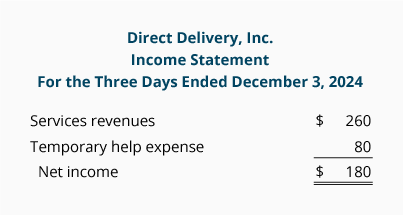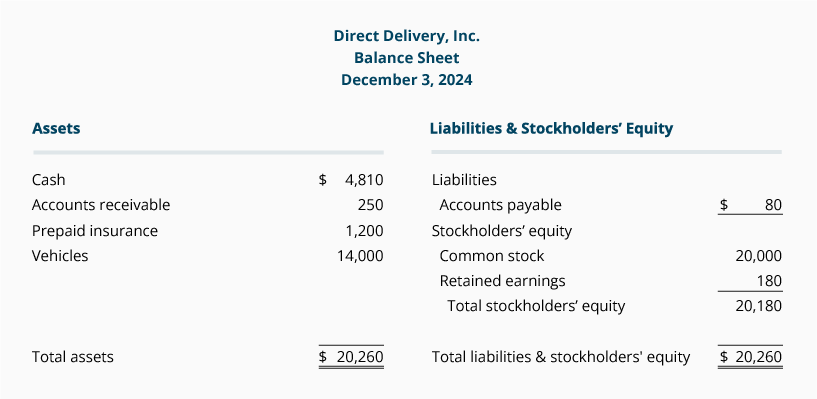What Kind Of Account Is Service Revenue
Sample Transactions #4 - #6
Sample Transaction #4
The fourth transaction occurs on December 3, when a client gives Directly Commitment a check for $10 to evangelize two parcels on that day. Because of double entry, we know there must be a minimum of ii accounts involved—one of the accounts must be debited, and one of the accounts must be credited.
Considering Direct Delivery received $10, it must debit the account Cash. It must also credit a second account for $ten. The second business relationship will exist Service Revenues, an income statement account. The reason Service Revenues is credited is because Directly Delivery must written report that it earned $x (not because information technology received $x). Recording revenues when they are earned results from a basic bookkeeping principle known equally the revenue recognition principle. The following tip reflects that principle.
Here's a Tip
Revenues accounts are credited when the company earns a fee (or sells merchandise) regardless of whether cash is received at the time.
Here are the two parts of the transaction as they would look in the general periodical format:

Sample Transaction #v
Let's assume that on December 3 the company gets its second customer—a local visitor that needs to take fifty parcels delivered immediately. Joe's price of $250 is very appealing, so Joe's company is hired to deliver the parcels. The customer tells Joe to submit an invoice for the $250, and they will pay it inside vii days.
Joe delivers the 50 parcels on December 3 as agreed, meaning that on December 3 Directly Delivery has earned $250. Hence the $250 is reported as revenues on Dec iii, even though the visitor did not receive any cash on that day. The effort needed to complete the job was done on December three. (Depositing the cheque for $250 in the bank when it arrives seven days afterward is not considered to take whatever attempt.)
Let'south identify the 2 accounts involved and decide which needs a debit and which needs a credit.
Because Direct Commitment has earned the fees, one account volition exist a revenues account, such as Service Revenues. (If you refer dorsum to the final TIP, you will read that acquirement accounts—such as Service Revenues—are usually credited, meaning the second account volition need to be debited.)
In the full general journal format, here'southward what nosotros have identified so far:

Nosotros know that the unnamed account cannot be Cash because the company did non receive money on Dec 3. All the same, the company has earned the right to receive the coin in seven days. The account title for the money that Direct Delivery has a right to receive for having provided the service is Accounts Receivable (an nugget account).

Over again, reporting revenues when they are earned results from the basic bookkeeping principle known as the revenue recognition principle.
Sample Transaction #6
For simplicity, permit'southward presume that the only expense incurred by Straight Delivery and so far was a fee to a temporary help agency for a person to assist Joe deliver parcels on December 3. The temp agency fee is $80 and is due past December 12.
If a company does not pay cash immediately, you cannot credit Cash. But because the company owes someone the money for its purchase, we say information technology has an obligation or liability to pay. Most accounts involved with obligations have the give-and-take "payable" in their name, and 1 of the most ofttimes used accounts is Accounts Payable. Also keep in heed that expenses are almost always debited.
The accounts and amounts for the temporary help are:

Hither's a Tip
Expenses are (most) always debited.
Here'due south a Tip
If a company does non pay cash right away for an expense or for an nugget, you cannot credit Cash. Because the company owes someone the money for its purchase, nosotros say it has an obligation or liability to pay. The almost probable liability account involved in business organisation obligations is Accounts Payable.
Revenues and expenses appear on the income statement every bit shown below:

Afterward the entries through December 3 have been recorded, the residual sheet volition look like this:

Discover that the year-to-engagement internet income (bottom line of the income argument) increased Stockholders' Equity by the same amount, $180. This connexion betwixt the income argument and rest sheet is important. For one, it keeps the residue sheet and the accounting equation in balance. Secondly, it demonstrates that revenues volition cause the stockholders' disinterestedness to increase and expenses will crusade stockholders' equity to decrease. After the end of the year financial statements are prepared, y'all will see that the income statement accounts (revenue accounts and expense accounts) will exist closed or zeroed out and their balances will be transferred into the Retained Earnings business relationship. This will hateful the revenue and expense accounts will start the new yr with zero balances—allowing the company "to keep score" for the new year's day.
Marilyn suggested that possibly this introduction was enough textile for their first meeting. She wrote out the following notes, summarizing for Joe the of import points of their give-and-take:
-
When a company pays cash for something, the visitor volition credit Cash and will accept to debit a 2d account. Assuming that a company prepares monthly financial statements—
-
If the amount is used upwards or will expire in the current month, the business relationship to be debited will be an expense business relationship. (Advertising Expense, Rent Expense, Wages Expense are iii examples.)
-
If the amount is not used up or does not expire in the current month, the account to exist debited will be an asset account. (Examples are Prepaid Insurance, Supplies, Prepaid Rent, Prepaid Advertising, Prepaid Association Dues, Land, Buildings, and Equipment.)
-
-
When a visitor receives cash, the company volition debit Cash and will have to credit another business relationship. Assuming that a company will set monthly financial statements—
-
If the corporeality received is from a cash auction, or for a service that has only been performed but has non however been recorded, the account to be credited is a acquirement account such as Service Revenues or Fees Earned.
-
If the amount received is an accelerate payment for a service that has not yet been performed or earned, the account to be credited is Unearned Acquirement.
-
If the corporeality received is a payment from a customer for a auction or service delivered earlier and has already been recorded as revenue, the account to exist credited is Accounts Receivable.
-
If the amount received is the gain from the visitor signing a promissory note, the business relationship to be credited is Notes Payable.
-
If the amount received is an investment of boosted coin by the owner of the corporation, a stockholders' equity account such every bit Common Stock is credited.
-
-
Revenues are recorded every bit Service Revenues or Sales when the service or sale has been performed, not when the cash is received. This reflects the basic accounting principle known as the revenue recognition principle.
-
Expenses are matched with revenues or with the catamenia of time shown in the heading of the income statement, not in the period when the expenses were paid. This reflects the bones bookkeeping principle known equally the matching principle.
-
The fiscal statements also reflect the basic accounting principle known as the price principle. This means assets are shown on the balance sheet at their original cost or less and not at their electric current value. The income argument expenses also reflect the cost principle. For instance, the depreciation expense is based on the original cost of the asset being depreciated and not on the current replacement toll.
Accept Our Practice Quiz
We recommend that you now accept our free Practise Quiz for this topic and then that y'all can...
- Run into what y'all know
- See what you don't know
- Deepen your agreement
- Amend your retentiveness
Note: You lot can receive instant access to our PRO materials (visual tutorials, flashcards, quick tests, quick tests with coaching, cheat sheets, video training, bookkeeping and managerial guides, business organisation forms, printable PDF files, and progress tracking) when you lot bring together AccountingCoach PRO.
Please Note...
You should consider our materials to be an introduction to selected accounting and bookkeeping topics, and realize that some complexities (including differences between financial argument reporting and income tax reporting) are non presented. Therefore, always consult with bookkeeping and revenue enhancement professionals for assistance with your specific circumstances.
What Kind Of Account Is Service Revenue,
Source: https://www.accountingcoach.com/accounting-basics/explanation/7
Posted by: cainshead1975.blogspot.com


0 Response to "What Kind Of Account Is Service Revenue"
Post a Comment